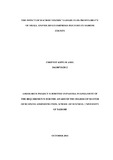| dc.contributor.author | Cheptot, Abel K | |
| dc.date.accessioned | 2014-11-14T06:44:25Z | |
| dc.date.available | 2014-11-14T06:44:25Z | |
| dc.date.issued | 2014-10 | |
| dc.identifier.citation | Degree Of Master Of Business Administration, University Of Nairobi, 2014 | en_US |
| dc.identifier.uri | http://hdl.handle.net/11295/74825 | |
| dc.description.abstract | SME industry is vital for creation employment to a significant proportion of the population as well as elimination of social problems. The Kenya Economic Survey report shows that the SME sector contributed 89.7% of new jobs created in year in Kenya 2013. In 2012 the SME industry contributed over 80% of the countries employment with majority of new jobs being created in that sector and contributes about 70% to the country’s GDP. Therefore, enhanced profitability of SME industry leads to additional job creation and economic growth. Conducive macroeconomic environment promotes the profitability of SMEs which propels them to a stage where they can access financing for sustained growth. High-lending rates tend to discourage companies from financing projects through loans from commercial banks and thus they resort to a rather less expensive financing which includes informal financing which is said to be more limiting and indirectly more expensive. Inflation on the other hand leads to decline in the units sold by informal sector firms while increasing their turnover in nominal terms. The effect of these macro economic variables on profitability of small and micro enterprises industry remains unknown with no study in Kenya done on the same. The study sought to determine the effect of macroeconomic variables on profitability of small and micro enterprises industry in Nairobi. The study adopted a descriptive design. The total population was all small and micro enterprises in Nairobi County. A sample of 100 SMEs in Nairobi County was selected using a stratified random sampling technique. The study used secondary data to determine the effect of macroeconomic variables on profitability of small and micro enterprises. Secondary data collection was obtained for five years relating SMEs profitability and macroeconomic variables for years 2009 to 2013. The study found that interest rates and inflation rates have significant effect on profitability of small and micro enterprises industry in Nairobi County and that exchange rates are also negatively related to SMEs profitability even though the effect if not statistically significant. The study also found that GDP growth had strong positive relationship with SMEs profitability where growth in real GDP leads to higher SMEs industry profitability. The study also found that macroeconomic variables combined had strong relationship with profitability of profitability SMEs. Macroeconomic variables could account for 85% of the changes in profitability of SMEs industry. The study recommended that Central Bank of Kenya to formulate policies to stabilize macroeconomic variables. | en_US |
| dc.language.iso | en | en_US |
| dc.publisher | University of Nairobi | en_US |
| dc.title | The Effect of Macroeconomic Variables on Profitability of Small and Micro Enterprises Industry in Nairobi County | en_US |
| dc.type | Thesis | en_US |
| dc.type.material | en_US | en_US |

